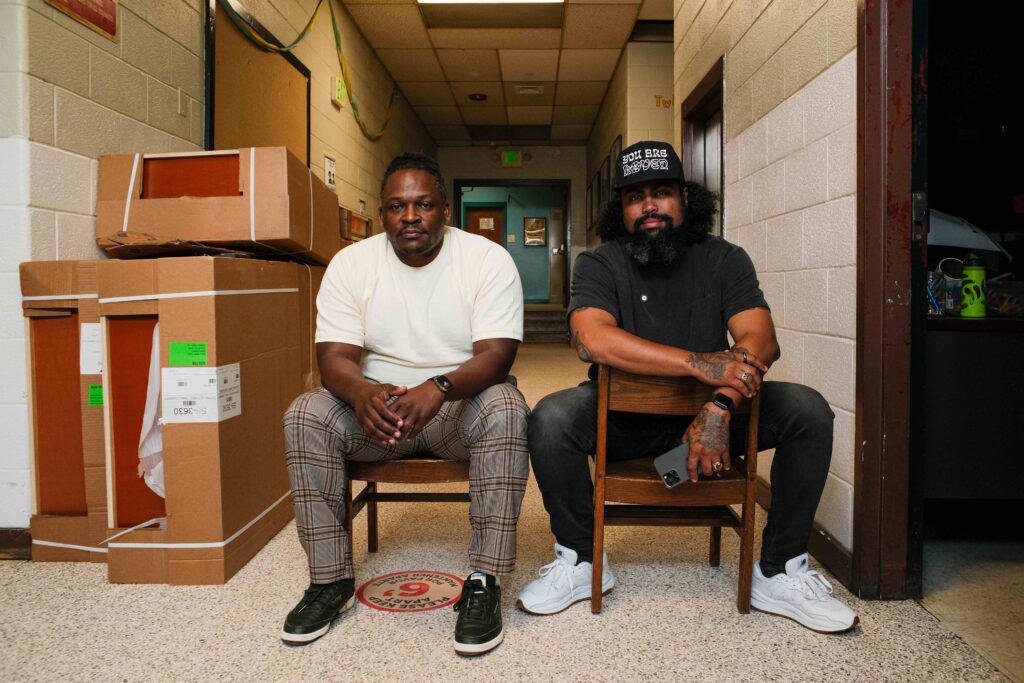
By Donte P. Johnson and Jason Bass
Donte P. Johnson is General Manager, and Jason Bass is Director of Culture and Impact at Revival Baltimore (a JDV by Hyatt hotel)
The very first hotel job I applied for was a referral from a friend.
I showed up in a suit with my résumé, ready to go. The manager came out, looked at me, and then went back into her office and had someone come out and tell me she’d give me a call back.
They never did.
I later found through my friend after a lot of phone tag that they were never going to interview me once they saw my hair didn’t meet their grooming standards. Men couldn’t have long hair. That was 20 years ago, but I think there are a lot of employee handbooks that could still use an update to this day.
Fortunately, I already had another interview scheduled with Kimpton and called them to say I understood there may be grooming standards in the industry I may not meet, and if that wasn’t going to work, I couldn’t work there because I wasn’t going to cut my locs. They invited me to come in anyway and see how the conversation went. I ended up getting the job, and from there quickly increased my responsibilities.
From my last day at the front desk to my first day as a GM was six years. Revival is now the sixth hotel I’ve managed.
Donte Johnson

Culture creates a feeling and sends a message
People have a difficult time describing what culture is because we can’t say a room is 75% more vibey because we’re playing a certain track. You can’t measure it that way. That’s why it’s hard to wrap people’s minds around a topic like culture because it’s conceptual.
You can describe certain parts of culture but at the heart of it, it’s more of an art than science. It’s a feeling when you walk into a space.
Jason Bass

I walk through beautiful spaces where I appreciate the aesthetic but don’t have a feeling. I’ve walked around other places that may not be as aesthetically pleasing, but I get an incredible feeling of being home. That’s culture. It sends you a message because it gives you a feeling.
The culture of a physical environment could be the smells, the sounds, the color – all the things that create a moment.
But internal culture is a bit more intangible. It shows up in guest feedback that your hotel immediately feels different. It shows up when you hear your employees say that they’ve never felt so seen before. It shows up when prospective job candidates say their mother referred them to us because she told them they need to get a job here because we really care about people. It shows up when people feel welcomed regardless of their identity.
The culture we are creating here is shaped by our experiences
I remember vividly what my experience was like as a new job candidate every minute I’ve been in this industry.
I almost wasn’t able to enter the hotel business just because of how I looked. I could’ve been God’s gift to hospitality, but based on how I looked from 20 feet away, someone made a decision that they weren’t going to spend five minutes talking with me.
It’s more than a personal thing. From a business standpoint, the hotel industry is in a massive arms race for talent, caused by decades of turning people away based on their appearance and getting away with it. We just accepted things as they were because we didn’t have an alternative.
Donte Johnson
We want to create a culture here at Revival that people would choose over other career options. A big part of that centers on people being able to show up as their full selves and seeing themselves represented in the space.
It’s hard to see yourself in a space when you don’t see yourself in what’s in the space. That’s everything from the music that’s played to the people you see working at the hotel and how they’re dressed.
We need to revisit dress codes and grooming standards to welcome people to work with us

I often speak with our guests dressed in a sweatshirt and khakis and Chucks. When I’m speaking at the front desk, it’s obvious I’m working here. But even when I’m not there, at the end of the conversation, they’ll ask if they can have my business card, which sometimes surprises me – but they tell me based on the conversation I’m clearly somebody in charge of things. That shows how intuitive guests are.
We don’t give hotel guests enough credit, and this affects how so many uniform and dress standards come about. The first objection is always, “How will guests know who works here?” Well, the person standing with an earpiece at the front door is probably someone who works at the hotel!
My people at the front desk dress better than I do. Why would I pick out something for them to wear? “Your earrings can’t be above a certain size to work at the front desk.” Why? “People have to wear blazers in Baltimore in July when it’s over 100°.” Why?
There’s nothing in our day-to-day lives that’s the same as 50 years ago, except for 45% of every employee handbook.
What if instead of clinging to the things that exist until they are no longer viable, we got rid of everything that didn’t serve us and run our hotels like a start-up? If no one had ever told us what things are supposed to be like, what would we think are the best ideas now?
We need to change our definition of “polish”
We have witnessed situations where people are described as being polished or unpolished, articulate or not articulate.
We wouldn’t say that someone who had a British accent can’t work at the front desk. But if they had a local accent from Baltimore, people have said they shouldn’t be customer-facing.

We had a guy on our team who worked in housekeeping and who wanted to work at the front desk, but had been held back elsewhere because he wasn’t “polished” or “articulate.” But what does a person who grew up in Baltimore sound like?
We have to challenge these things because no one ever says, “My experience at a hotel was really great, but that one guy at the front desk with a Baltimore accent really threw me off.”
If we have the right people in the right places, it doesn’t matter what accent they have.
If in the same building, we have international leaders with very heavy accents, but do not allow somebody to reach what should be the most accessible level of progress within a hotel because they sound like they grew up a few miles away from the hotel, what is that saying about what we deem to be valuable and what we do not? How can we possibly have an industry that is welcoming and inclusive and hospitable if we are segmenting value that way?
What we look for when we’re hiring or attracting people for our team
We want great energy in our hotel.
We had a woman come in and apply for a job at the front desk who just walked into the hotel. That’s not a thing that happens a lot in 2023. I asked her how she heard about us and she said her mother saw us on TV saying, “If you’re a good person, just come down here and we’ll find something for you.”
Most everything in this building can be taught. I walked in off the street one day and didn’t know anything. Six years later, they let me run the place.
Historically we’ve put so many barriers in place, which is absurd in a world that is short-staffed and looking for people.
Hotels have a boring problem, not a staffing problem
The hotel industry as a whole is at risk.
We need to introduce some new fresh interesting ideas that are not completely driven by numbers or finances. We live in a capitalist society, but succeeding today is going to require going back to finding a balance between art and science and allowing room for innovation.
This is the time for disruption.
When I hear people say that people don’t want to work, I think they’re missing the point. I heard someone say once, “Retail is not dead – bad retail is dead.” It’s the same with the hotel industry and the talent shortage the industry is experiencing.
There are hotels and restaurants that are incredibly well-staffed, and they tend to be the places where people are compensated and cared for the best.
In places they are not, you see an exaggerated version of the condition of the broader industry.
As an industry, we need to stop saying people don’t want to work. It’s more nuanced than that.
It’s easy to blame people for not wanting to work in the industry versus blaming the industry for not inspiring them to show up.
Whoever has the most money has the most responsibility. If I’m the person paying you, then I am more responsible for the culture that exists than you are.
Follow Donte Johnson (Instagram: @TheHoodieHotelier) and Jason Bass (Instagram: @JasonCBass) at Revival Baltimore









